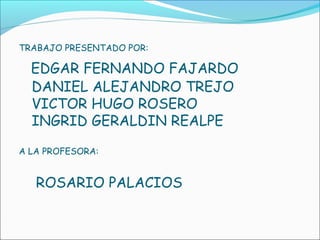
Voz pasiva presentacion final
- 1. TRABAJO PRESENTADO POR: EDGAR FERNANDO FAJARDO DANIEL ALEJANDRO TREJO VICTOR HUGO ROSERO INGRID GERALDIN REALPE A LA PROFESORA: ROSARIO PALACIOS
- 4. La voz pasiva en inglés se utiliza generalmente en registros escritos, artículos científicos y documentos técnicos, pero también en periódicos u otros documentos formales.
- 5. Se dice que una oración está en VOZ PASIVA cuando la significación del verbo es recibida por la persona gramatical a quien aquél se refiere: San Juan de Pasto was founded by Sebastián de Belalcázar. ► San Juan De Pasto fue fundada por Sebastián de Belalcázar.
- 6. la voz pasiva nos permite hablar de objetos, procesos o personas que son sujetos pasivos de acciones emprendidas por otras personas, y de esta manera darles protagonismo en nuestro discurso.
- 7. COMO CAMBIAR VOZ ACTIVA A VOZ PASIVA Localizamos el complemento directo de la activa. Éste será el Sujeto Pasivo Verbo: To Be (en el tiempo de la activa) + Participio Pasado Verbo de la Activa Si lo deseamos, convertimos el Sujeto Activo en Complemento Agente, anteponiéndole BY.
- 8. VOZ ACTIVA: VOZ PASIVA: We eat a pizza The pizza is eaten by us We are eating a pizza The pizza is being eaten by us We were eating a pizza The pizza was being eaten by us We ate a pizza The pizza was eaten by us We have eaten a pizza The pizza have been eaten by us We will eat a pizza The pizza will be eaten by us We are going to eat a pizza The pizza is going to be eaten by us
- 9. Las construcciones impersonales (se dice, se comenta, etc.) se forma con la estructura sujeto + to be + participle. It is reported (Se informa); It is said (Se dice); It is known (Se sabe); It is supposed (Se supone); It is considered (Se considera); It is expected (Se espera). EJEMPLOS: It is thought that Cathy works very hard. (Se piensa que Cathy...) It is believed that TOM is wearing a white suit. (Se cree que Tom ...)
- 10. 1. PRESENTE SIMPLE: Formula: S + TO BE + VERBO (PARTICIPIO) + C Ej. I read the book voz pasiva: The book is read by me
- 11. 2. PASADO SIMPLE. Formula: S + TO BE ( Was/Were ) + VERBO(PARTI.)+ C Ej. He wrote the news yesterday voz pasiva: The news were written by him yesterday
- 12. 3. PRESENTE PROGRESIVO. Formula: S + TO BE + BE(ING) + VERBO( PARTICI.)+ C Ej. You are cutting the meat on the table voz pasiva: The meat is being cut on the table by you
- 13. 4_ PRESENTE PERFECTO FORMULA: S + (Has/Have) +BEEN+ VERBO( PARTICI.)+ C EJ: Camilla has written a letter voz pasiva: A letter has been written by Camilla
- 14. 4. FUTURO-WILL Formula: S + WILL + BE + VERBO ( PARTICI.)+ C Ej. She will do the exercise voz pasiva: The exercise will be done by her
- 15. 5. FUTURO-GOING TO Formula: S + TO BE + GOING TO + BE + VERBO + C PARTICI. Ej. They are going to get a new car voz pasiva: A new car is going to be gotten by them
